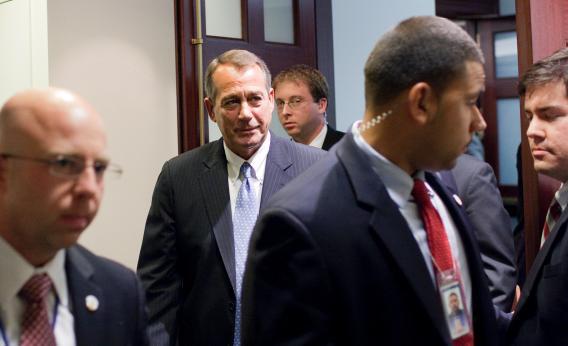Last night’s semi-surprising news that John Boehner discovered he lacks the votes to pass “Plan B” fiscal cliff legislation led to a surprising level of freaking out in some quarters. But what you have to understand is the right-wing of the caucus’ rejection of Boehner’s plan makes a deal more likely not less likely.
The short argument is based on nomenclature. Plan A was negotiations with the president. The existence of Plan B was bad for the odds of a deal because it was an alternative to Plan A. Now that it turns out Plan B doesn’t work, it’s back to Plan A. Plan A may fail, but it looks healthier today than it would if Plan B was still alive. After all, Boehner’s bill to push the top marginal income tax bracket all the way up to $1 million and starve the government of revenue isn’t something Obama was about to accept. But Boehner wasn’t going to write the bill, whip votes for it, pass it, and then abandon it at the first wave of a presidential veto plan. Plan B, were it alive, would need to run around and play out for a while. But now it’s dead, the back-benchers are going home, and the key players can go back to negotiating.
The longer argument is that we learned something important about Republicans last night. What we learned is that though the clutch of die-hards is too big to let Boehner pass bills that lack Democratic support, these die-hards are not the majority of the caucus. Most House Republicans were prepared to back Boehner. Which is to say that most House Republicans, at the end of the day, endorse a pragmatic rather than a metaphysical view of tax politics.
This matters because the metaphysical view is the official caucus position. Republicans say that faced with the expiration of the Bush tax cuts, any vote for any bill that extends some of the tax cuts while letting others expire is a tax increase. But obviously in real-world terms, striking a deal with the White House for a partial extension of the tax cuts leaves taxes lower than where they’ll be in an over-the-cliff scenario. By proposing Plan B, Boeher admitted that this latter pragmatic interpretation of the situation is correct. And unlike in debt ceiling talks, he got firm support from Eric Cantor, Kevin McCarthy, Paul Ryan, and other players. And though a critical bloc defected from the leadership, the majority of the caucus stood with their leaders.
If Boehner does strike a deal with Obama, he can easily afford to lose dozens of back-benchers since Nancy Pelosi will deliver many Democratic votes for a bargain. People are saying Boehner would risk his Speakership by doing this, but I don’t think that’s clear. Boehner has relied on Democratic votes many times before, Philip Klein says many House Republicans understand he’s in a tough position. And who’s going to beat him? During the debt ceiling talks, Boehner was constantly looking over his shoulder at the threat of a challenge from Cantor. Today, Boehner is leading a much more unified team. Is a deal going to happen over the weekend? I don’t know. But the odds are better than they were 24 hours ago.
